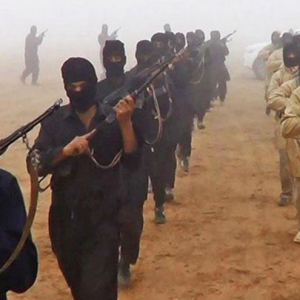I’m tired of hearing our presidential candidates talk about ISIS.
Before you phone me into the Department of Homeland Security, let me clear a few things up. No, I’m not a Homeland-style sleeper agent, or worse, a peacenik activist. To the contrary, I’m a veteran of the U.S. Army. I served and saw combat in both Iraq and Afghanistan. I have no illusions about the dangers that radical extremists pose to our allies and interests abroad, or the view of the world that the United States holds dear.
But my problem with the current slate of presidential candidates is that ISIS is, with few exceptions, the only threat they want to talk about. What’s worse is that so many of the candidates have talked about it for so long without actually saying anything relevant or insightful about the threat it poses.
I’m glad everyone takes the ISIS threat seriously, even if many of the candidates’ proposals (“carpet bombing” until the sand glows) are more bluster than substance. In any case, our would-be commanders-in-chiefs need to apply a similar level of seriousness to the other critical threats to our national security.
I want to hear how they plan to manage the rise of China. How they will stop Beijing from building artificial military bases in international waters, or set the rules of the road for trade in the Asia Pacific region? Keeping things peaceful with our biggest geopolitical rival requires more strategy in engagement than tough talk—I want to hear about how we’re going to rally and lead our allies like Japan and South Korea to stay secure and prosperous.
I want to hear how they intend to strengthen our cybersecurity. What is the relationship they would push the government to have with the private sector, and how would they balance the privacy and security of the American people? How and when do we take punitive action when states like China and Russia are found to have supported cyberattacks? Investments in this area can mean everything from preventative steps to safeguard our own networks and data, to offensive measures that shut down the capabilities of our enemies. Every candidate should be well-versed in cyber issues, because ‘the future’ is no longer a distant, abstract thing.
Finally, I want to hear how they’re going to tackle the nuclear question. This administration led a seven year diplomatic effort to freeze and begin dismantling Iran’s nuclear program—how would the next president build on that non-proliferation success? And how would they deal with North Korea’s troubling pursuit of ever more powerful nuclear weapons and the threat that poses to us and our allies in the region?
U.S. voters are concerned about terrorism because it’s an issue that impacts us all. So for the time being, I know our candidates will keep talking about ISIS more often than not, and that other security concerns in the region like Iran and Afghanistan will rightfully draw their attention, too. It’s a critical and worthwhile debate. But as an electorate, we need to demand more of those aspiring to the highest office in the land.
The president doesn’t need to be an expert on every issue, but he or she needs to be more than a one-trick pony. It’s time we heard more from our candidates on all the ways that the United States can engage—and ultimately lead—the world.

